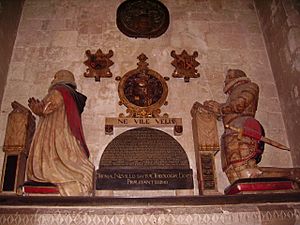Alexander Neville (scholar) facts for kids
Alexander Neville (born 1544, died 1614) was an English scholar. He was famous as a historian and a translator. He also served as a member of the English Parliament.
Life of Alexander Neville
Alexander Neville was the brother of Thomas Neville, who was the Dean of Canterbury Cathedral. Their father was Richard Neville from South Leverton, and their mother was Anne Mantell.
Alexander studied at the University of Cambridge, where he earned his Master's degree in 1581. After university, he likely studied law in London. There, he met the writer George Gascoigne.
Soon after, Alexander Neville began working for Archbishop Matthew Parker as a secretary. He helped Parker with some of his writings. After Archbishop Parker died in 1575, Alexander continued to work for the next Archbishops, Edmund Grindal and John Whitgift.
Alexander Neville was also a Member of Parliament, which means he was elected to represent people in the English government. He represented different areas like Christchurch in 1585, Peterborough in 1597, and Saltash in 1601.
Alexander Neville passed away on October 4, 1614. He was buried in Canterbury Cathedral on October 9. His brother, Thomas Neville, had a monument built there to remember both of them.
Alexander Neville's Works
Alexander Neville wrote several important works. His main work was a book written in Latin about Kett's rebellion of 1549. This rebellion was a protest by farmers in Norfolk, England. His book also included a description of the city of Norwich and its old buildings. This book was published in 1575.
In his book, Neville wrote a part that some people found offensive. It talked about the Welsh soldiers who helped stop Kett's rebellion. Because of this, a new version of the book was quickly printed without the offensive sentences. Neville also published an apology in 1576 to explain his mistake. Later, in 1615, an English translation of his book about Kett's rebellion was published.
Neville also wrote Latin poems and other writings. One of his first published works was a translation of the play Oedipus by the Roman writer Seneca. He translated it into English in 1563. This translation was later included in a collection of Seneca's plays in 1581.
In 1587, Neville published a collection of Latin poems dedicated to Philip Sidney, a famous poet and soldier who had recently died. He also wrote some English poems that were included in a book by his cousin, Barnabe Googe, in 1563.
 | Isaac Myers |
 | D. Hamilton Jackson |
 | A. Philip Randolph |


